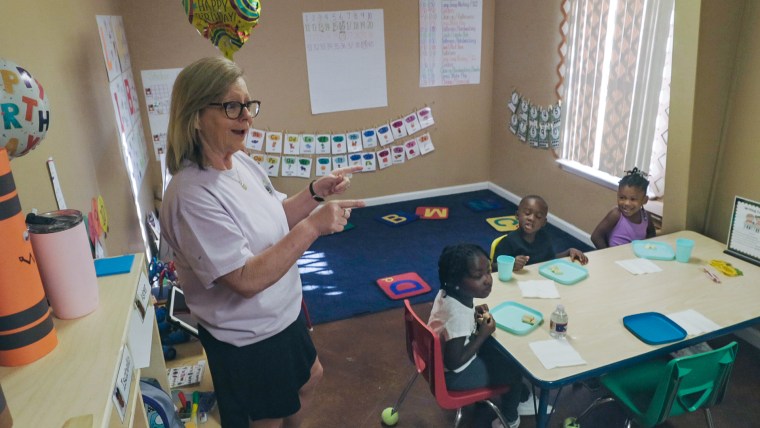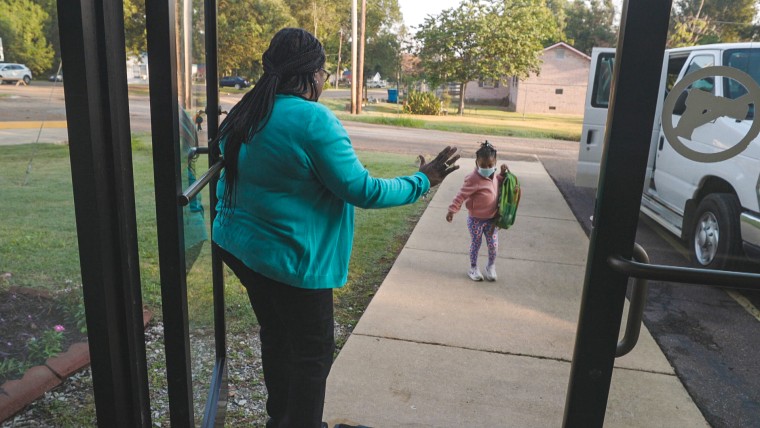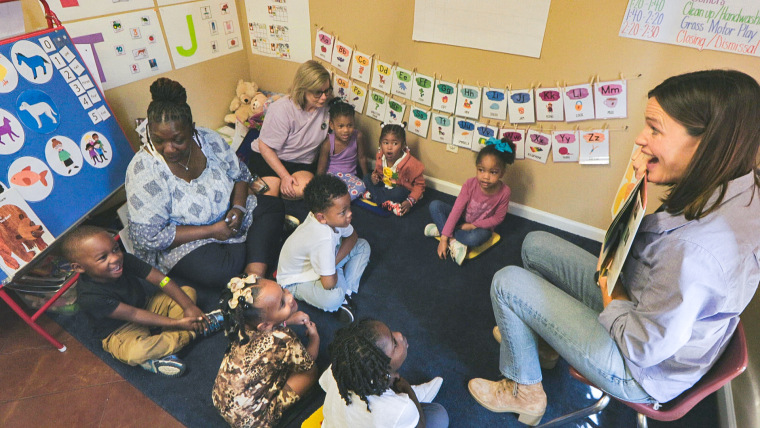When Evelyn Jossell took over as the superintendent of schools in Quitman County, she had no illusions about the challenges ahead.
Poverty has long had a stranglehold on this rural, predominantly Black community in the Mississippi Delta. It was the poorest county in the poorest state when Martin Luther King Jr. visited in 1968 and described seeing “hundreds of Black boys and Black girls walking the streets with no shoes to wear.”
Today, 57% of children in Quitman County live below the poverty line (the national average is 16%). And with the area’s textile factories and cotton processing plants now shuttered, few jobs exist in a place that went years without a single grocery store.
As superintendent, Jossell quickly identified her most pressing problem. The majority of students couldn’t read at grade level. So in 2016 she began sketching out what was then a pie-in-the-sky idea: a literacy program geared toward Quitman County’s youngest children.
“I wanted something to meet them when they were really young because I felt that’s where the gap was,” Jossell said.
Seven years later, her vision has become a reality.
Jossell’s Early Learning Academy opened its doors in April in the 1,200-person town of Lambert. The program focuses on building early reading skills in its 3- and 4-year-olds as well as providing their parents with the tools to help the children succeed. The goal is to have the kids ready for kindergarten and launched on a path toward reading.
“We’re trying to show that when you intervene early enough, you’re equipping young people to become better readers and ultimately better leaders,” said Jossell, a former social worker who was born and raised in the Mississippi Delta.

The state has made major strides in improving child literacy. In 2013, Mississippi fourth graders ranked 49th in the nation for reading proficiency. By 2022, the state had risen to 21st and other states were seeking to duplicate what some had called the “Mississippi miracle.”
Experts say there are many factors in the state’s improved performance. Mississippi abandoned the “sight” method — learning words by reference to pictures and context — and moved to the teaching of phonics. The state also placed a greater emphasis on hiring better principals who were able to recruit better teachers.
Still, only 29% of students from the Quitman County School District are proficient in reading, according to 2022-2023 data from the Mississippi Department of Education, and that's where Jossell’s academy comes in.
Angela Sykes Rutherford, a professor at the University of Mississippi and the director of its Center for Excellence in Literacy Instruction, said a program like Jossell’s benefits both the students and their parents, who might otherwise not have the freedom to work.
“We know how critically important it is for kiddos to be engaged in learning opportunities, especially language, from birth until they enter school,” Rutherford said.
“For centers like the one in Quitman County, it provides quality early care and education,” she added, “and it provides opportunities for families to participate in the workforce.”

The school is funded not by the government but by Save the Children, a global nonprofit founded in 1919.
Yolanda Minor, Save the Children’s Mississippi state director, said she reviewed Jossell’s plan for the program in 2016 and had been trying to secure funding ever since.
“It’s amazing to actually see a dream come true,” Minor said. “I wanted something where not only were we reaching children, we were reaching parents as well.”
Multiple studies have shown that the more parents are involved in their child’s studies, the more likely the students are to be successful in school. The challenges are stark in Quitman County, where an estimated 48% of adults struggle to read at a basic level, according to the National Center for Education Statistics.
As part of the Early Learning Academy program, teachers visit students’ homes and provide educational activities for the parents to do with their children. Minor said it’s a crucial part of the program as many parents “wake up in survival mode.”
“I have never met a parent that didn’t want to give their child the best possible start in life,” Minor said. “But many just don’t know how. Does that make them a bad parent? No. It means they lack the resources and they need more help to ensure that they’re able to support their children’s education.”

Because of her years as superintendent of schools, Jossell was able to attract highly qualified and experienced administrators and teachers to the Early Learning Academy. The teachers are given a small number of students and work with a curriculum that has proved to be effective in getting young children ready to read.
For Jossell, the school is a family affair. It’s located inside a building owned by her husband’s church, which is next door.
Rev. Michael Jossell, one of 10 children who grew up working the cotton fields to help his parents make ends meet, said his father couldn’t read, but his mother, who left school in eighth grade, impressed upon them the importance of education.
“Education was the key for getting us out of that environment,” Michael Jossell said. The couple has five grown children.
Kiera Jamison has two boys at the school — Grayson, 4, and Remi, 3. Jamison said Remi wasn’t talking before she enrolled him in April and now he can say the alphabet and count to 20.
“He has just taken off ever since we enrolled him here,” Jamison said.
Another parent, Shaquayla Kidd, who enrolled her daughter Royalty in the program in August, described it as a blessing.
“I don’t have to worry about her being behind,” Kidd said.
There is another major benefit. With Royalty in school, Kidd has been able to provide for her family without having to scrounge together the money for child care.
“It gives me leeway to be able to work,” said Kidd, who works at a gas station in the town of Marks.
Actor Jennifer Garner, a longtime Save the Children board member and ambassador, visited the school in October for a first look at the program. She arrived just in time to join in as a group of children played a passionate game of musical chairs in the gymnasium.
“We have people who are despairing, who see no hope for the future, and that splashes backwards onto their kids,” said Garner, who grew up in rural West Virginia. “They feel invisible.”

Later, Garner watched as a veteran teacher, Cheryl Howard, led the students in an exercise designed to improve their fine motor skills: painting a picture of a butterfly.
Garner noted that there were striking differences in the butterfly paintings between the students who had just arrived at the school and those who had been there since April. The paintings done by the children who’d been at the school for six months were far more detailed and precise, showing the control they had gained over their fine motor skills.
“If you have not developed those skills and you get to kindergarten and you’re asked to write your name, it might be really frustrating for you,” Garner said. Over time, that could lead some children to give up on school, she added.
“I wish it could be replicated across America,” Garner said of the program.
© OfficialAffairs